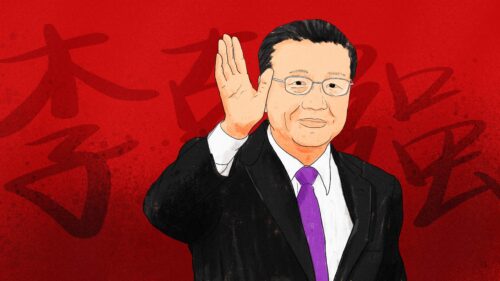The neighbors hate China’s new map
...and Crocs are cool in China | August 31, 2023
| Dear reader:
Why is China so bad at winning friends and influencing people? There are a multitude of reasons, and today highlights one key factor: The Communist Party’s insistence on loudly publicizing its view of itself and of the country it runs. Today’s soft power failure from Beijing is the issue of a new official map that has many of China’s neighbors up in arms, because of the map’s expansive territorial claims. Compare this with the U.S. government, which does not publish official maps showing the full extent of territories it controls around the world, which go far beyond the “logo map” of the lower 48 states. In yesterday’s news briefing, we said that Vladimir Putin and Xí Jìnpíng 习近平 had declared a “no limits” partnership, “less than three weeks after Russia invaded Ukraine.” Of course, it should have been “less than three weeks before” the Russian invasion. We regret the error. Our Word of the Day is:
If you’re not already a subscriber, sign up for our Daily Dispatch, or our free Weekly. |
 |
Jeremy Goldkorn Editor-in-Chief |
CURRENT AFFAIRS
China’s new map draws outrage from its neighbors |
 Illustration for The China Project by Derek Zheng Illustration for The China Project by Derek Zheng |
The Philippines has joined India, Malaysia, Vietnam, and Taiwan in opposing China’s new national map, which lays claim to almost all of the South China Sea and contested areas along its land border with India.
China’s new map clearly depicts the “nine-dash line” — a territorial claim to most of the South China Sea based on a map published in 1947 by the Republic of China government of the KMT, which was then based in Nanjing.
Cue fierce backlash from China’s neighbors.
The map also stakes claim over disputed territories along China’s land border with India: On August 29, India became the first country to lodge a “strong protest” with China over the new map, which shows the northeastern state of Arunachal Pradesh and the contested Aksai Chin plateau as part of China’s territory. Click here for all the details.
Nadya Yeh |
NEWS BRIEFING
| Here’s what else you need to know about China today:
Xí Jìnpíng 习近平 has still not confirmed if he will attend the G20 Summit in India, New Delhi has stated. Reports have indicated that Xi will likely skip out on the meeting, after he led last week’s BRICS summit — the members of which include Brazil, Russia, India, China, and South Africa — intended to counterbalance U.S.-led Western groupings. Baidu and ByteDance launched their artificial intelligence (AI) chatbots to the public today, after the two Chinese technology giants were among a handful of AI startups that received regulatory approval from Beijing. Chinese companies have been racing to be the first to launch a rival to Microsoft’s OpenAI chatbot — though have struggled to live up to their hype. Anyone with a Chinese phone number will be able to access Baidu’s Ernie Bot for free, starting today. The Doubao chatbot, which was released by ByteDance on August 18, and the Zidong Taichu 2.0, released in June by the Institute of Automation at the Chinese Academy of Sciences, are reportedly also included in the first batch of approvals. China and Nicaragua signed a free trade agreement today, Chinese state media reported, as the two countries continue to deepen economic ties since the Central American country switched its allegiance to Beijing from Taiwan in 2021. Japan plans to raise its defense spending to a record 7.7 trillion yen ($52.67 billion) for the 2024 fiscal year, its defense ministry announced today, as it seeks to counter rising military threats from China and North Korea. The Japanese government plans to double its defense spending to 2% of its GDP by 2027 under its landmark national security strategy, which has named China its “greatest strategic challenge.” China raised the highest typhoon warning for Typhoon Saola as the storm — with winds of more than 200 kilometers per hour (125 miles per hour) — approaches its southeastern coastline near Hong Kong and other major manufacturing hubs in neighboring Guangdong Province. Chinese state media: Xinhua News Agency headlines a piece on Xi Jinping leading a Politburo meeting to review a set of Party rules on “cadre education and training work,” much of which involves training Party members to implement “Xi Jinping Thought on Socialism with Chinese Characteristics for a New Era.” The People’s Daily’s front page follows the lead of Xinhua’s story from yesterday with a piece on Xi Jinping calling for an investigation and punishment of those responsible for a deadly flash flood at a highway construction site in Sichuan Province. The front page also has a story on British Foreign Minister James Cleverly meeting Vice President Hán Zhèng 韩正. (The U.K.’s Guardian newspaper said “Cleverly’s humiliating China visit was the perfect symbol of isolated, ill-led ‘global Britain.’”
|
UYGHUR BULLETIN
Canada probes Walmart, Hugo Boss, Diesel, Nike about forced Uyghur labor |
 Illustration by Derek Zheng Illustration by Derek Zheng |
The Canadian operations of big box retailer Walmart, clothing manufacturers Hugo Boss, Nike, Ralph Lauren, and Diesel are the latest among 14 firms to be investigated by the Canadian Ombudsperson for Responsible Enterprise (CORE), a labor abuse watchdog.
CORE was established in 2018 to investigate allegations of human rights abuses in Canadian companies’ foreign operations in the garment, mining, and oil and gas sectors.
Giant Chinese online fashion retailer Shein, currently valued at $64 billion, has been a significant forced-labor offender, according to activists, who aim to pressure the Canadian government to scrutinize the firm.
|
BUSINESS AND CONSUMER CULTURE
How Crocs made a comeback in China this summer |
 Illustration for The China Project by Derek Zheng Illustration for The China Project by Derek Zheng |
Crocs’s classic, easily slipped-on clogs — once synonymous with being bulky, unsightly, and uncool — have been enjoying a renaissance in China among young consumers.
For Crocs, the growing popularity of its synthetic shoes has already translated into a major surge in sales.
Zhao Yuanyuan |
MORE FROM THE CHINA PROJECT
| A hedonistic portrait of Old Beijing: British scholar John Blofeld arrived in Beijing in 1934, in his early 20s, seeking aesthetic and sensual pleasures.
Nearly three decades later, he wrote City of Lingering Splendour, recounting an “Old Peking” saturated in the final vestiges of its luxurious imperial past. This is book No. 34 in Paul French’s Ultimate China Bookshelf.
|
FROM THE NEWSBASE
Below are links from our NewsBase to other noteworthy reports published in the last 24 hours from and about China.BUSINESS AND TECHNOLOGY:Economic gloom or boom Foreign investors sell China shares at record pace in August / FT (paywall) Why China’s efforts to juice stocks typically don’t last / Caixin (paywall) Airplanes and airlines Electric bicycyles and electric cars Chinese EV maker Hozon raises $960m in crossover financing / Nikkei Asia (paywall) Automobile industry Banking Semiconductors AI Life insurance Manufacturing Real estate and property development Lower pork prices and higher costs hit major major sellers Huawei SCIENCE, HEALTH, AND ENVIRONMENT:Typhoon Saola Climate cooperation Food security Renewable energy POLITICS AND FOREIGN AFFAIRS:Anti-espionage law Corruption in the military South China Sea G20 summit China’s Xi likely to skip G20 summit in India / Reuters U.S.-China competition and tensions U.S. military drills amidst tension with China Nicaragua Germany European Union Japan SOCIETY AND CULTURE:Tennis Basketball Movies China brings retired teachers back to class
|
</table





